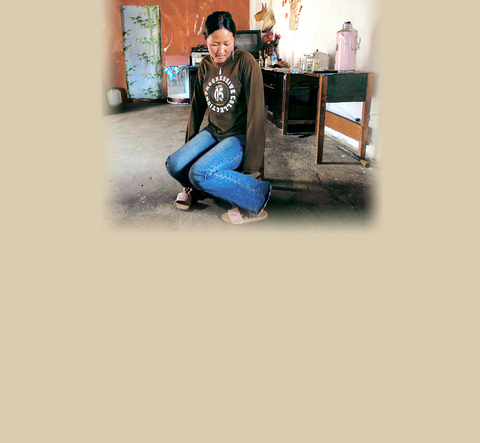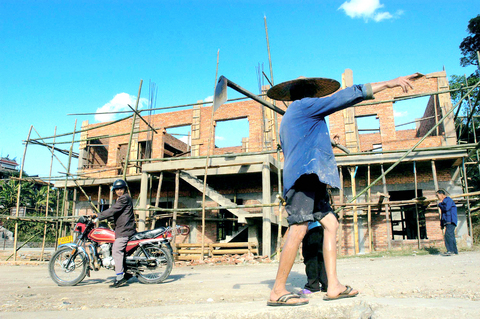There are two kinds of families in this village: the relatively rich, who live in tiled villas with air conditioning, and those who still hunt in the wooded hills with bow and arrow and send their sons off to become Buddhist monks when there are too many mouths to feed.
Such distinctions once lay in questions like who tills their paddies by hand under the broad, open skies in this rice-growing region of southwestern China, and who owns a water buffalo to perform the backbreaking work. But more and more these days, relative prosperity is tied to which families have daughters, many of whom go to Thailand and Malaysia to work in brothels.

"If you don't go to Thailand and you are a young woman here, what can you do?" said Ye Xiang, 20, whose features still had the pudgy, unformed quality of a teenager's. "You plant and you harvest. But in Thailand and Malaysia, I heard it was pretty easy to earn money, so I went."

PHOTO: NY TIMES
At least 20 other young women from this tiny hamlet, which clings to a hillside just off a trunk road near the Mekong River, have headed off to foreign lands to work in the sex trade. "All of the girls would like to go, but some have to take care of their parents," Ye said.
In this regard, there is nothing peculiar about Langle, at least nothing peculiar for this part of Yunnan province, whose women are favorites in the brothel industry from Thailand, whose national language is related to their own dialect, all the way to Singapore.
Experts say that in some local villages the majority of women in their 20s work in this trade, leaving almost no family untouched, and the young men without mates. Not long ago, many of the recruits were kidnapped to become modern-day sex slaves, but these days the trade has become largely voluntary.
Ye told her story a bit haltingly, but without evident shame. Indeed, her father, a poor farmer, greeted visitors with glasses of hot water, in lieu of tea, and listened, along with a toothless aunt, as she spoke above the tinny noise of a cheap radio in their sparsely furnished one-room shack with a bare cement floor.
She told of her sacrifices -- from hiding in the baggage compartment of a bus to evade immigration police to the groping she endured in bars, where she lived not from a salary, but from patrons' "tips," the sex with strangers and the fear of AIDS. But what underpinned it all were dreams: of marriage to an overseas Chinese, or of at least putting away enough money to be able to return home in triumph.
Ye's first two years in Thailand had not yielded the success she had hoped for. She had earned only enough to eat and buy clothes, not leaving enough to help out her parents. But she was not discouraged, and neither were they. There had been a suitor, and she was eagerly preparing to go back.
"There's a guy in Malaysia, and he calls me every day," she announced proudly, showing off the cellphone he had bought her.
That dreams like these have come true in the past, however naive they may sound, is beyond dispute. This region is strewn with muddy villages crowded with tumbledown shacks, where a gleaming villa with gaudy gold-and-green gates and satellite dish emerges suddenly from the undifferentiated mass.
In some villages, indeed, the migrants' successes have been numerous enough to transform the hamlet itself, sprouting dazzling pockets of affluence that bear comparison with a Shanghai suburb. For this reason, unlike most of China where male children are highly prized, here it is the daughters who literally bring good fortune.
"These girls are motivated by their families and by their neighbors for one basic reason, because they are really poor," said a Beijing-based sociologist who has studied the migrant sex trade in Yunnan.
"The women come home and build big cement homes, and this is like an advertisement to others: This is an easy way to make money. Everyone knows what these women are doing in Thailand, but no one calls it prostitution, even local officials, who talk only of girls `working outside.'"
The sociologist, who asked not to be identified because the subject was so sensitive, said that disease was rampant among women who worked in the sex trade, a situation aggravated by the fact that public health care was denied to illegal foreign workers in Thailand. Despite this, the researcher said, no special efforts have been made to prevent the spread of AIDS in Yunnan by women returning from working in the sex trade in Thailand.
In Mengbin, a small village of the Dai minority, of Thai ethnicity, reached after several hours' drive, the sex trade had completely transformed the local life, starting with the sumptuous villas that had become the rule rather than the exception.
The practice of using beauty and sex to secure a livelihood had even worked its way into the home designs, with tiles depicting willowy, long-haired maidens interspersed here and there on the external walls and gates.
One rich matron, Dao Xiaoshan, proudly invited a visitor into her chateau-like home, with lace-covered couches, four chandeliers, a large, golden Buddhist altar and twin home-entertainment centers.
The secret of this bounty, she said lay in her husband's ownership of a coal mine. Others might conclude her luck was in having two daughters, 23 and 21 and beautiful, as seen in large, formal photographic portraits she had on display, including one showing a daughter dressed up in the gilt and violet regalia of a Thai princess.
"They have been able to work outside, but I've never asked them what they do," said Dao, who appeared to be in her 50s. Lately, she said, one daughter had found happiness with a rich Singaporean, the other with a wealthy Malaysian.
What about the young men here? "Dai boys can't marry Dai girls, because they all leave, and the ones who come back don't like the local boys anymore," Dao said, with a chuckle.
"Dai girls are beautiful, and they are very popular, but not all of them bring home money. Some of them don't know how to do anything but spend money and have a good time."

In the March 9 edition of the Taipei Times a piece by Ninon Godefroy ran with the headine “The quiet, gentle rhythm of Taiwan.” It started with the line “Taiwan is a small, humble place. There is no Eiffel Tower, no pyramids — no singular attraction that draws the world’s attention.” I laughed out loud at that. This was out of no disrespect for the author or the piece, which made some interesting analogies and good points about how both Din Tai Fung’s and Taiwan Semiconductor Manufacturing Co’s (TSMC, 台積電) meticulous attention to detail and quality are not quite up to

April 21 to April 27 Hsieh Er’s (謝娥) political fortunes were rising fast after she got out of jail and joined the Chinese Nationalist Party (KMT) in December 1945. Not only did she hold key positions in various committees, she was elected the only woman on the Taipei City Council and headed to Nanjing in 1946 as the sole Taiwanese female representative to the National Constituent Assembly. With the support of first lady Soong May-ling (宋美齡), she started the Taipei Women’s Association and Taiwan Provincial Women’s Association, where she

It is one of the more remarkable facts of Taiwan history that it was never occupied or claimed by any of the numerous kingdoms of southern China — Han or otherwise — that lay just across the water from it. None of their brilliant ministers ever discovered that Taiwan was a “core interest” of the state whose annexation was “inevitable.” As Paul Kua notes in an excellent monograph laying out how the Portuguese gave Taiwan the name “Formosa,” the first Europeans to express an interest in occupying Taiwan were the Spanish. Tonio Andrade in his seminal work, How Taiwan Became Chinese,

Mongolian influencer Anudari Daarya looks effortlessly glamorous and carefree in her social media posts — but the classically trained pianist’s road to acceptance as a transgender artist has been anything but easy. She is one of a growing number of Mongolian LGBTQ youth challenging stereotypes and fighting for acceptance through media representation in the socially conservative country. LGBTQ Mongolians often hide their identities from their employers and colleagues for fear of discrimination, with a survey by the non-profit LGBT Centre Mongolia showing that only 20 percent of people felt comfortable coming out at work. Daarya, 25, said she has faced discrimination since she